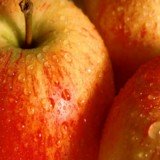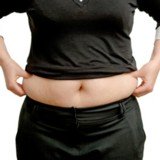Salmon Nutrition Facts
Salmon Nutrition Facts and Health Benefits, Omega 3 & Vitamin D
 There are different types of pacific salmon, that is, Chinook, Steelhead, Pink, Chum, Sockeye and Coho. These all differ when it comes to taste, cost and texture. When comparing between ocean-farmed and wild salmon, the healthier choice would be the ocean-farmed salmon. This is because it is an excellent source of Omega-3 fatty acids and Vitamin D, is full of high quality protein and low in saturated fat. Also, it is flavorful and this is something that most chefs and even the general folk who love cooking appreciate about the ocean-farmed salmon.
There are different types of pacific salmon, that is, Chinook, Steelhead, Pink, Chum, Sockeye and Coho. These all differ when it comes to taste, cost and texture. When comparing between ocean-farmed and wild salmon, the healthier choice would be the ocean-farmed salmon. This is because it is an excellent source of Omega-3 fatty acids and Vitamin D, is full of high quality protein and low in saturated fat. Also, it is flavorful and this is something that most chefs and even the general folk who love cooking appreciate about the ocean-farmed salmon.
Omega-3 Fatty Acids
Fatty acids are crucial to include in one's diet, more so if they want to eat healthy. Examples include Omega-3 and Omega-6 fatty acids. These you may find in fish oils including salmon. Omega-3 and Omega-6 fatty acids are referred to as 'essential' fatty acids. This is because our bodies cannot produce them naturally so we have to get them through our diet. It's beneficial to add them to your diet because they are especially helpful in the nervous, cardiovascular, immune and reproductive systems. They have also been found to maintain healthy joints by reducing inflammation and joint pain.
Omega-3 fatty acids help to promote healthy skin, protect against heart disease and are crucial in the proper neurological development in unborn babies and young children. Expecting mothers especially need to have such foods as salmon in their pregnancy diet due to the tremendous health benefits, not only for themselves but for their babies as well. It is the omega-3 fatty acids that assist in the proper eye, nervous system and brain development in the developing fetus.
Vitamin D
As we mentioned earlier, salmon is a good source of Vitamin D. One of the many things that this vitamin does for and in your body is strengthen your bones, maintain your bone structure and stability. It also helps to regulate blood sugar levels, helps lower blood pressure and helps to prevent the occurrence of several diseases such as rickets, asthma, arthritis, viral infections and many more.
Selenium
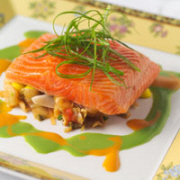 Salmon, no matter what type it is, whether it's raw or cooked in whichever way, is also an excellent source of Selenium. In most cases salmon provides you with over 100% of the trace mineral. So what do we gain from Selenium? It is important for several things in the body and we will take time to discuss a few of them. One of the important functions of Selenium is in helping to keep your immune system healthy. It is especially true when it is combined together with Vitamins C and E. This obviously means that your body will be ready to deal with any infection that may enter it.
Salmon, no matter what type it is, whether it's raw or cooked in whichever way, is also an excellent source of Selenium. In most cases salmon provides you with over 100% of the trace mineral. So what do we gain from Selenium? It is important for several things in the body and we will take time to discuss a few of them. One of the important functions of Selenium is in helping to keep your immune system healthy. It is especially true when it is combined together with Vitamins C and E. This obviously means that your body will be ready to deal with any infection that may enter it.
When selenium boosts your immune system, it will also help your body to fight against diseases and complications such as heart attack, stroke, heart disease and different types of cancer such as liver, pancreas, bladder, cervix, rectum cancer and a few more. One of the ways in which selenium promotes the good health of your heart is by increasing the level of HDL cholesterol, which is known to be the "good" type of cholesterol. When HDL cholesterol increases, it means the levels of LDL "bad" cholesterol will be getting reduced, which is of utmost importance for a healthy heart.
Another benefit of selenium is that it also acts as an antioxidant, fighting against free radicals that may damage our DNA. Selenium neutralizes smoke, alcohol and fats. In addition to this, it is also involved in the maintenance of your eyes, hair and skin. Finally, studies on the trace mineral have shown that it may also possibly be helpful in preventing macular degeneration and cataracts. Salmon is also a good, in most cases, an excellent, source of Protein. In fact, most seafood is an excellent source of the nutrient. Protein has many functions in the body. It's used in the building and repairing of tissues as well as in making hormones and enzymes amongst other things.
Health Benefits of Salmon in Summary
In a nutshell, Salmon nutrition facts have revealed that salmon
- aids in weight; this is due to some 2 proteins found in the fish,
- provides a reduced risk of diabetes and cancer,
- boosts the immune system, especially because of the presence of selenium and finally,
- due to the presence of omega-3 fatty acids, salmon lowers blood pressure and cholesterol levels.
We will now take a look at some salmon nutrition facts. The percent daily values (DV) are based on a 2,000 calorie diet. Your values may be higher or lower depending on your daily calorie needs.
Wild Salmon Nutrition Facts
These are nutrition facts for Atlantic wild salmon that is cooked. It is an excellent source of Protein, Riboflavin, Vitamin B12, Phosphorus and Selenium. It is also a good source of a few more minerals and nutrients. The cholesterol content needs to be looked out for as it is heading towards the high side.
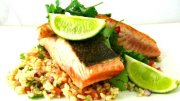
- Serving size- half fillet (154g)
- Calories- 280
- Calories from Fat- 113
- Total Fat- 13g, 19% DV
- Saturated Fat- 2g, 10% DV
- Cholesterol- 109mg, 36% DV
- Sodium- 86mg, 4% DV
- Total Carbohydrate- 0g, 0% DV
- Dietary Fiber- 0g, 0% DV
- Sugars- 0g
- Protein- 39g, 78% DV
- Vitamin A- 1% DV
- Vitamin C- 0% DV
- Calcium- 2% DV
- Iron- 9% DV
- Thiamin- 28% DV
- Riboflavin- 44% DV
- Vitamin B6- 73% DV
- Folate- 11% DV
- Vitamin B12- 78% DV
- Pantothenic Acid- 30% DV
- Magnesium- 14% DV
- Phosphorus- 39% DV
- Potassium- 28% DV
- Zinc- 8% DV
- Copper- 25% DV
- Manganese- 2% DV
- Selenium- 103% DV
- Water- 92g
Cooked Salmon Nutrition Facts
Cooked pink salmon nutrition facts are as follows; low to medium in calories, also low in fat and sodium. It is a source of Vitamin A, Calcium, Iron, Riboflavin, Zinc and Folic Acid. It also is a good source of Thiamin, Pantothenic Acid and Vitamin B6. Above these, it is an excellent source of Protein, Niacin, Vitamin B12, Phosphorus and Selenium.
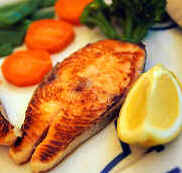
- Serving size- half fillet (124g)
- Calories- 185
- Calories from Fat- 49
- Total Fat- 5g, 8% DV
- Saturated Fat- 1g, 4% DV
- Trans Fat- 0g
- Cholesterol- 83mg, 28% DV
- Sodium- 107mg, 4% of DV
- Total Carbohydrate- 0g ,
- Dietary Fiber- 0g
- Sugars- 0g
- Protein- 32g, 64% DV
- Vitamin A- 3% DV
- Vitamin C- 0% DV
- Calcium- 2% DV
- Iron- 7% DV
- Thiamin- 16% DV
- Riboflavin- 5% DV
- Niacin- 53% DV
- Vitamin B6- 14% DV
- Folic Acid- 2% DV
- Vitamin B12- 72% DV
- Pantothenic Acid- 11% DV
- Phosphorus- 37% DV
- Magnesium- 10% DV
- Potassium- 15% DV
- Zinc- 6% DV
- Selenium- 101% DV
- Water- 86g
Raw Salmon Nutrition Facts
Raw Chinook salmon nutrition facts reveal that it is an excellent source of Niacin, Protein, Vitamin B6, Vitamin B12, Phosphorus, Magnesium and once again, Selenium. It however is quite high in calories as only half a fillet gives you 354 calories. So one can imagine if you eat a whole fillet. For those who are watching their calories or want to lose weight, this may not be an ideal food for you to eat in that regard.
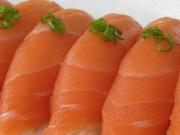
- Serving size- 1/2 fillet (198g)
- Calories- 354
- Calories from Fat- 186
- Total Fat- 21g, 32% DV
- Saturated Fat- 6g, 31% DV
- Cholesterol- 99mg, 33% DV
- Trans Fat- 0g
- Sodium- 93mg, 4% of DV
- Potassium- 350mg, 10% DV
- Total Carbohydrate- 0g
- Dietary Fiber- 0g
- Sugars- 0g
- Protein- 39g, 78% DV
- Vitamin A- 18% DV
- Vitamin C- 13% DV
- Calcium- 5% DV
- Iron- 3% DV
- Vitamin E- 12% DV
- Thiamin- 7% DV
- Riboflavin- 13% DV
- Niacin- 83% DV
- Vitamin B6- 40% DV
- Folic Acid- 15% DV
- Vitamin B12- 43% DV
- Pantothenic Acid- 15% DV
- Phosphorus- 57% DV
- Magnesium- 47% DV
- Potassium- 22% DV
- Zinc- 6% DV
- Copper- 4% DV
- Selenium- 103% DV
- Water- 142g
Grilled Salmon Nutrition Facts
Grilled salmon is low in calories, total fat, saturated fat and fair in it's cholesterol and sodium content. One fillet of grilled salmon according to its nutrition facts provides your body with 32% of your recommended daily value of Protein. It is also a good source of Iron and a good source of Potassium.
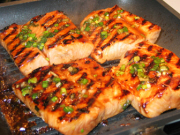
- Serving size- 1 fillet
- Calories- 100
- Calories from Fat- 25
- Total Fat- 3g, 5% DV
- Saturated Fat- 0.5g, 3% DV
- Polyunsaturated Fat- 1g
- Monounsaturated Fat- 2g
- Cholesterol- 35mg, 12% DV
- Sodium- 270mg, 11% of DV
- Total Carbohydrate- 1g, 0% of DV
- Dietary Fiber- 0g
- Sugars- 1g
- Protein- 16g, 32% DV
- Vitamin A- 0% of DV
- Vitamin C- 0% of DV
- Calcium- 0% of DV
- Iron- 2% of DV
- Potassium- 11% of DV
Smoked Salmon Nutrition Facts
Smoked Chinook salmon nutrition facts show us that it is a source and good source of a number of minerals, nutrients and vitamins. Like most of the salmon covered in this article, it is an excellent source of Protein, Vitamin B12 and Selenium. However, the sodium content needs to be looked out for as it is near the high side. Too much sodium in your system may lead to adverse health effects such as high blood pressure.
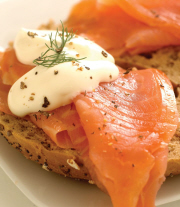
- Serving size- 1 cup (136g)
- Calories- 159
- Calories from Fat- 53
- Total Fat- 6g, 9% DV
- Saturated Fat- 1g, 6% DV
- Cholesterol- 31mg, 10% DV
- Sodium- 1066mg, 44% of DV
- Total Carbohydrate- 0g
- Dietary Fiber- 0g
- Sugars- 0g
- Protein- 25g, 50% DV
- Vitamin A- 2% of DV
- Vitamin C- 0% of DV
- Calcium- 1% of DV
- Iron- 6% of DV
- Vitamin E- 9% DV
- Riboflavin- 8% DV
- Niacin- 32% DV
- Vitamin B6- 19% DV
- Vitamin B12- 74% DV
- Pantothenic Acid- 12% DV
- Magnesium- 6% DV
- Phosphorus- 22% DV <
- Potassium- 7% of DV
- Copper- 16% DV
- Selenium- 63% DV
- Water- 98g
Canned Sockeye Salmon Nutrition Facts
One of the disadvantages of canned sockeye salmon is that it's moderate to high in its total fat, saturated fat and cholesterol content. These, according to the food pyramid diagram should be consumed in very little quantities. The food pyramid diagram gives a guide on the quantities of foods we should eat from each food group. Too much of these may also lead to undesirable health effects such as heart disease and the like.
On the good side though, canned sockeye salmon is an excellent source of Protein providing you with 152% of your recommended daily allowance of the nutrient. Nutrition facts on canned sockeye show that it is also an excellent source of Calcium, Riboflavin, Niacin, Vitamin B6, Phosphorus, Potassium and Selenium.
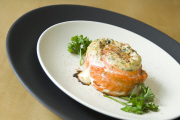
- Serving size- 1 can (369g)
- Calories- 565
- Calories from Fat- 243
- Total Fat- 27g, 42% DV
- Saturated Fat- 6g, 30% DV
- Trans Fat- 0g
- Cholesterol- 162mg, 54% DV
- Sodium- 277mg, 12% DV
- Total Carbohydrate- 0g
- Dietary Fiber- 0g
- Sugars- 0g
- Protein- 76g, 152% DV
- Vitamin A- 13% DV
- Vitamin C- 0% DV
- Calcium- 88% DV
- Iron- 22% DV
- Riboflavin- 42% DV
- Niacin- 101% DV
- Vitamin B6- 55% DV
- Folic Acid- 9% DV
- Vitamin B12- 18% DV
- Pantothenic Acid- 20% DV
- Phosphorus- 120% DV
- Potassium- 40% DV
- Magnesium- 27% DV
- Zinc- 25% DV
- Copper- 15% DV
- Selenium- 187% DV
- Water- 254g
Baked Salmon Nutrition Facts
Baked salmon nutrition facts reveal that it is basically a source of Dietary Fiber, Carbohydrates, Vitamin A, Calcium, Iron and Potassium. It is also a good source of Vitamin C and once again, an excellent source of Protein.
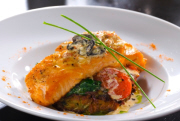
- Serving size- 1 serving
- Calories- 218
- Calories from Fat- 111
- Total Fat- 12g, 19% DV
- Saturated Fat- 2g, 12% DV
- Polyunsaturated Fat- 5g
- Monounsaturated Fat- 4g
- Cholesterol- 67mg, 22% DV
- Sodium- 68mg, 3% DV
- Total Carbohydrate- 3g, 1% of DV
- Dietary Fiber- 0.2g, 1% of DV
- Sugars- 1g
- Protein- 23g, 46% DV
- Vitamin A- 1% of DV
- Vitamin C- 20% of DV
- Calcium- 2% of DV
- Iron- 2% of DV
- Potassium- 452mg
Salmon Nutrition Facts: Sushi Roll
Sushi is one of the common foods from Asia. There are several varieties and you may find out more about some of them in the article sushi nutrition facts. According to its nutrition facts, the salmon sushi is a good source of Carbohydrates, Dietary Fiber and a very good source of Protein. The sodium and total fat content is fair and its cholesterol content is low. The Salmon sushi roll does not contain any saturated fat.
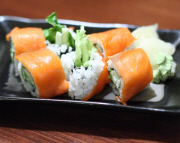
- Serving size- 1 roll (8 pieces)
- Calories- 388
- Calories from Fat- 85.5
- Total Fat- 9.5g, 14% DV
- Saturated Fat- 0g
- Trans Fat- 0g
- Cholesterol- 12mg, 4% DV
- Sodium- 543mg, 22% DV
- Total Carbohydrate- 60g, 19% DV
- Dietary Fiber- 4.4g, 17% DV
- Sugars- 0g
- Protein- 15g, 30% DV
- Vitamin A- 0% DV
- Vitamin C- 0% DV
- Calcium- 0% DV
- Iron- 0% DV
Salmon Nutrition Facts: Caviar
When considering salmon caviar and its nutrition facts we realize that it is low in total fat and saturated fat. Its sodium content is moderate and the cholesterol content is heading towards high. Salmon caviar is however a source of Protein, Vitamin A, Calcium and a good source of Iron. Iron assists with the formation of red blood cells in the body which amongst other things aid in the transportation of oxygen in and around the body.
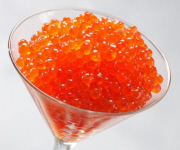
- Serving size- 1 tbsp
- Calories- 40
- Calories from Fat- 26
- Total Fat- 3g, 5% DV
- Saturated Fat- 1g, 5% DV
- Trans Fat- 0g
- Cholesterol- 94mg, 31% DV
- Sodium- 240mg, 10% DV
- Total Carbohydrate- 1g, 0% DV
- Dietary Fiber- 0g
- Sugars- 4g
- Protein- 4g, 8% DV
- Vitamin A- 3% DV
- Vitamin C- 0% DV
- Calcium- 4% DV
- Iron- 11% DV
Salmon Nutrition Facts: Burger
The salmon burger, according to its nutrition facts is fair in terms of its calories, total fat, saturated fat, cholesterol and sodium content. In terms of the nutritional value, it is basically an excellent source of Protein, providing you with 36% of your recommended daily value (DV) of the nutrient. You may compare this to a McDonalds' burger or KFC burger or even a Wendy's burger and see which would be a healthier option.
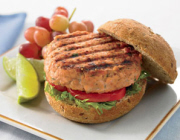
- Serving size- 1 patty
- Calories- 140
- Calories from Fat- 70
- Total Fat- 7g, 11% DV
- Saturated Fat- 1.5g, 8% DV
- Trans Fat- 0g
- Cholesterol- 50mg, 17% DV
- Sodium- 3200mg, 13% DV
- Total Carbohydrate- 0g
- Dietary Fiber- 0g
- Sugars- 0g
- Protein- 18g, 36% DV
- Vitamin A- 0% DV
- Vitamin C- 0% DV
- Calcium- 0% DV
- Iron- 0% DV
Salmon Nutrition Facts: Skin
Kippered Salmon King with skin nutrition facts have shown that it is a good source of Protein, Vitamin B12 and Selenium. It is also a source of quite a few other minerals, vitamins and nutrients which are helpful for several things in the body.
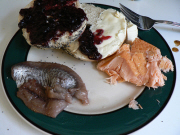
- Serving size- 1 oz (28g)
- Calories- 59
- Calories from Fat- 33
- Total Fat- 4g, 6% DV
- Saturated Fat- 1g, 3% DV
- Trans Fat- 0g
- Cholesterol- 19mg, 6% DV
- Sodium- 244mg, 10% DV
- Total Carbohydrate- 0g
- Dietary Fiber- 0g
- Sugars- 0g
- Protein- 6g, 12% DV
- Vitamin A- 0% DV
- Vitamin C- 0% DV
- Calcium- 2% DV
- Iron- 1% DV
- Vitamin D- 3% DV
- Vitamin E- 1% DV
- Thiamin- 1% DV
- Riboflavin- 3% DV
- Niacin- 12% DV
- Vitamin B6- 5% DV
- Vitamin B12- 17% DV
- Pantothenic Acid- 2% DV
- Phosphorus- 8% DV
- Potassium- 3% DV
- Magnesium- 2% DV
- Zinc- 1% DV
- Copper- 2% DV
- Selenium- 12% DV
- Water- 17g

